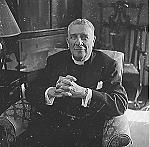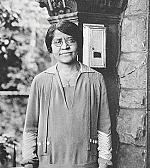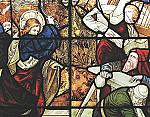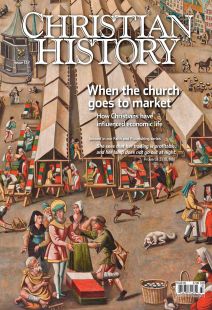Alternative economies
Most simply the story begins with a Mennonite. Edna Ruth Miller Byler(1904–1976)—known above all for her delicious doughnuts and cinnamon rolls—was hostess at the Mennonite Central Committee (MCC) headquarters in Akron, Pennsylvania, where her husband, Joe, was director of Civilian Public Service camps and material aid. The two journeyed to Puerto Rico in 1946. There Edna Byler met some women in the La Plata Valley who had joined a needlework project led by MCC workers Mary Lauver and Olga Martens. They created beautiful embroidery, but had no place to sell their handicrafts.
Byler, who everyone described as possessed of an entrepreneurial spirit, brought some of the needlework back to the United States and began to sell it out of the trunk of her Chevrolet to friends and at church gatherings, telling stories of the women who had made it.
Soon her customer base grew, and she was driving the Chevrolet around the country to represent the Overseas Needlework and Crafts Project. In 1958 she opened a store (she was now importing from Jordan and India as well), and in 1962 the MCC officially adopted the project. It was renamed SelfHelp and eventually became Ten Thousand Villages. Byler continued working with the project until she died. One obituary describes her:
The woman was a Martha—always expressing her faith through service. While others might be contemplating, she was working, and she always found a good cause to work at.
Free produce, fair coffee
Meanwhile the Church of the Brethren had developed an organization called SERRV (Sales Exchange for Refugee Rehabilitation and Vocations) in 1949; it brought South American goods to the United States. SERRV opened a store the same year as Byler did. Around then the British charity Oxfam began selling products from Chinese artisans in stores in the United Kingdom, eventually branching out to other countries and peddling everything from handcrafts to Christmas cards. As similar organizations developed in other countries over the next decades, they eventually came to cooperate officially in the World Fair Trade Organization, founded in 1989.
The idea predates both Byler and SERRV, though. The early nineteenth-century “Free Produce Society,” started by abolitionist Quakers, attempted to boycott slave-made produce and to buy and sell only produce created without exploitation at a price that took into account the labor that had produced it. Eventually similar societies formed in Britain. Some decades later, in 1897, the Salvation Army in Australia founded Hamodava Coffee Company, which attempted to pay coffee growers a fair price for their crops and help fund the growers’ purchase of their own land; it survived up until the Great Depression. But Byler and her Chevrolet were the direct ancestor of many fair trade groups operating today.
Fair trade organizations now focus on encouraging local crafts and crops—especially coffee—and on paying farmers and artisans a fair market price for their work; sometimes they are explicitly political, speaking out against illegal and unjust labor practices.
Fair trade goods were sold largely in fair trade stores (sometimes called World Shops) until the 1980s, but eventually activists in the Netherlands created the “Max Havelaar” fair trade label to certify products produced under that label had not been created by exploiting workers. This led in 1997 to Fairtrade Labelling Organizations International (FLO), which allows certified products to be sold in mainstream groceries and stores.
Today the movement faces conflict between those who wish to continue to grow it through labeling and certifying for the mainstream market and those who feel this focuses too much on the Western consumer and not on marginalized artisans. One wonders what Edna Byler’s opinion would have been about the way the trunk of her Chevrolet has expanded around the globe.
By Jennifer Woodruff Tait
[Christian History originally published this article in Christian History Issue #137 in 2020]
Jennifer Woodruff Tait is managing editor, Christian HistoryNext articles
What would Jesus do in business?
The rise, struggles, and promise of the faith and work movement
David W. MillerGod’s kingdom
Interviews with two scholars who study Christians and the Market
Denise Daniels, Brent Waters, and the editorMoney Matters: Recommended resources CH 137
Find more on the history of the church’s relationship with economics and the market in these resources selected by CH’s authors and editors.
The editors and issue authorsSupport us
Christian History Institute (CHI) is a non-profit Pennsylvania corporation founded in 1982. Your donations support the continuation of this ministry
Donate






